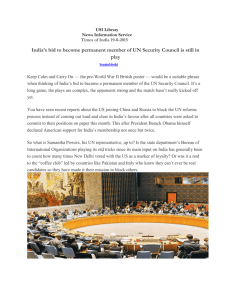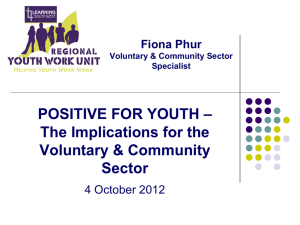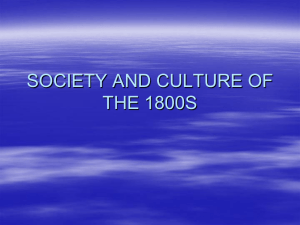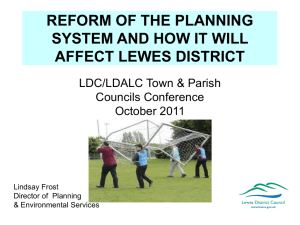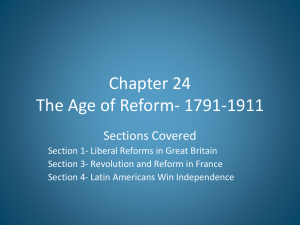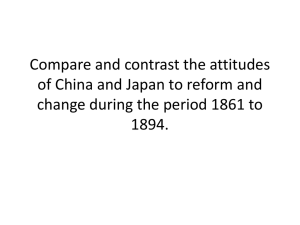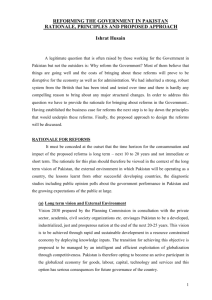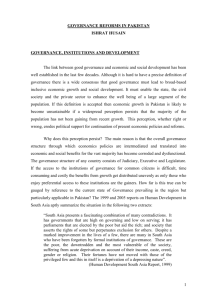Redefining Governance, Paper read at the SDPI Fourteenth Annual
advertisement
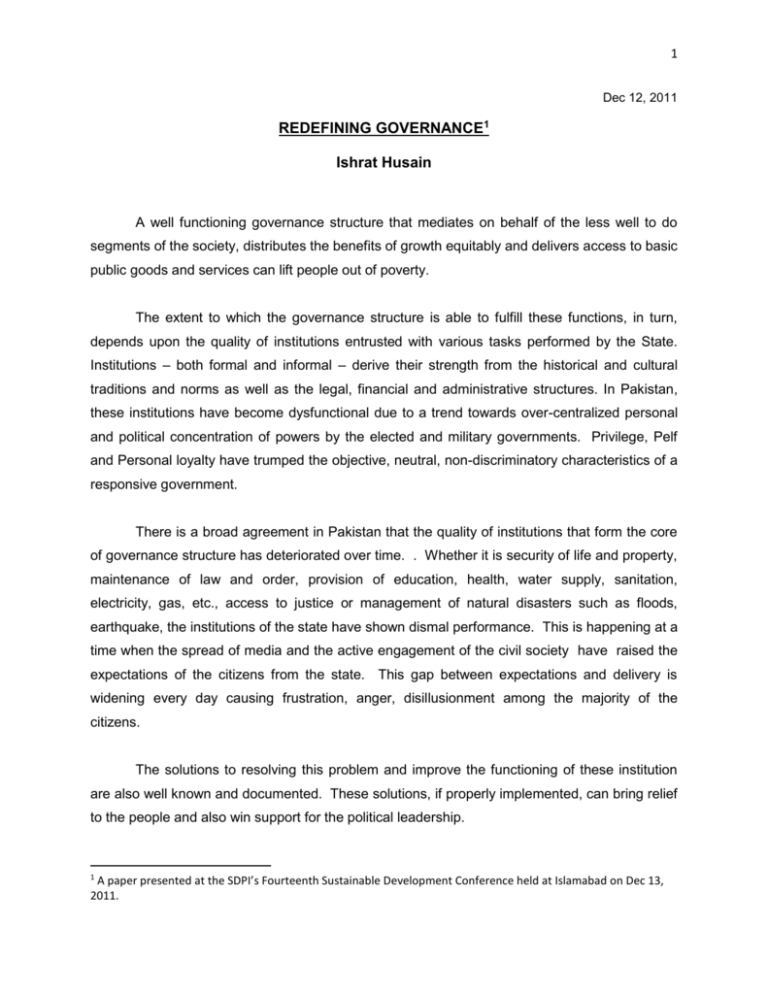
1 Dec 12, 2011 REDEFINING GOVERNANCE1 Ishrat Husain A well functioning governance structure that mediates on behalf of the less well to do segments of the society, distributes the benefits of growth equitably and delivers access to basic public goods and services can lift people out of poverty. The extent to which the governance structure is able to fulfill these functions, in turn, depends upon the quality of institutions entrusted with various tasks performed by the State. Institutions – both formal and informal – derive their strength from the historical and cultural traditions and norms as well as the legal, financial and administrative structures. In Pakistan, these institutions have become dysfunctional due to a trend towards over-centralized personal and political concentration of powers by the elected and military governments. Privilege, Pelf and Personal loyalty have trumped the objective, neutral, non-discriminatory characteristics of a responsive government. There is a broad agreement in Pakistan that the quality of institutions that form the core of governance structure has deteriorated over time. . Whether it is security of life and property, maintenance of law and order, provision of education, health, water supply, sanitation, electricity, gas, etc., access to justice or management of natural disasters such as floods, earthquake, the institutions of the state have shown dismal performance. This is happening at a time when the spread of media and the active engagement of the civil society have raised the expectations of the citizens from the state. This gap between expectations and delivery is widening every day causing frustration, anger, disillusionment among the majority of the citizens. The solutions to resolving this problem and improve the functioning of these institution are also well known and documented. These solutions, if properly implemented, can bring relief to the people and also win support for the political leadership. 1 A paper presented at the SDPI’s Fourteenth Sustainable Development Conference held at Islamabad on Dec 13, 2011. 2 The natural question then arises: if the diagnostics are clearly established and the prescriptions for the ailments are available why is it that the patient is still suffering. Political economy of reforms if Pakistan suggests that tough decisions are taken only when the country faces a serious crisis or a non-elected government assumes power and introduces reforms in various fields to assert its raison d’ etre for take over. Why is it that governments elected by popular vote in Pakistan have found it difficult to introduce and sustain reforms for improvement of institutions that will bring about positive results for the benefit of the electorate? There are a few factors that do not allow such an obvious outcome to take place in actual practice. First, there is time inconsistency problem. The pains caused by these reforms and the costs are incurred upfront while the benefits accrue over time. The political regime which has to undertake these reforms and thus bear these costs is reluctant because they risk losing popularity by enforcing harsh and painful measures. According to their calculation they have everything at stake while nothing to gain politically. It is difficult to attribute cause and effect of policy assuming that such attribution is possible. The beneficiaries of these reforms will attribute the benefits, when they occur, to the party that is in power at that time. This asymmetry in the incurrence of costs and the appropriation of gains from reforms, in so far that the opponents reap the dividends and take credit for them politically while the party initiating these reforms bears the risks , therefore becomes a stumbling block. Second, each set of reforms has winners and losers. The losers from reforms are identifiable, immediate and cohesive. If subsidies are eliminated, imported goods become expensive, wages decline and public sector employment is either frozen or cut those benefitting from these policies would raise hue and cry.. The pressures from the groups, who are losers from these reforms, would be intense. But the constituency that will support such reforms has not yet emerged because the gains of the reforms will be diffused across the society in a form that is still to gel. The winners are neither known nor organized. Absence of groups that support the reforms while the strong pressure from the vested interests that are going to lose because of these reforms do not allow the politicians to take the plunge in uncharted waters. Third, in case of Pakistan, the political and economic power have converged and is held by a small elite class. This class has rigged the markets to earn rents and accumulate private 3 and illicit wealth . The same class has also hijacked the state to prevent it from taking punitive action against those for example indulging in tax evasion, concealment of income, understatement of invoices for imported goods, forged documents for refunds, misappropriation of government money etc.. As any meaningful reforms will reduce the opportunities for rent seeking , remove discretionary favors in form of SROs, introduce open competition in award of mineral concessions, public contracts, land, etc. the political decision makers , who themselves belong to the same elite class are always able to find innumerable excuses and incredible reasons against the introduction of reforms. Under these circumstances where the political incentives of the Executive branch are clearly geared towards patronage, pelf and privileges for themselves and their party loyalists we have to explore other options that can pave the way for governance reforms. First, while a comprehensive blue print for long term reforms is desirable it is preferable to adopt a selective and strategic rather than an across-the-board approach. Only those institutions which would have a high pay off, spillovers and linkages to other sectors and activities should be taken first. For this purpose, we propose that at least eight key institutions whom we call ‘Institutions of Restraint’ should be reformed first. These are (a) Auditor General of Pakistan; (b) State Bank of Pakistan; (c) National Accountability Bureau; (d) Federal Provincial Election Commission; (e) Federal Provincial Ombudsman; (f) Securities and Exchange Commission; (g) Federal / Provincial Public Service Commissions; (h) Federal and Provincial Board of Revenue. Second, in a democratic form of government a system of checks and balances is necessary. The Parliament and Parliamentary Committees have not so far played the important role of oversight and accountability. The only exception has been the Public Accounts Committee (PAC) which has recently been acknowledged by Transparency International to have played important role in curbing corruption to some extent. Drawing from this successful example it is proposed that the appointments of the heads of these institutions should be confirmed by the Parliamentary Committees. These office holders will have a security of tenure and cannot be removed arbitrarily before the completion of their tenure without reference to the Parliamentary Committee that had confirmed the appointment in the first instance. 4 Third, key institutions even where the political leadership is ready for reforms, the issue of capacity for implementation becomes critical. Civil servants entrusted with the responsibilities for execution of various reforms are either not fully conversant with the knowledge, and contents or do not possess the skills required to build consensus are indifferent in their attitude. A sense of commitment , an ability to steer the course and take the process to its logical culmination are the critical success factors but these are found missing, by and large, among our civil servants. Selection of civil servants to assume key leadership positions should therefore be based on their performance and potential rather than on seniority or length of service or close affiliations. This change in incentive structure for the civil servants can go a long way in improving the prospects for better implementation of reforms.


